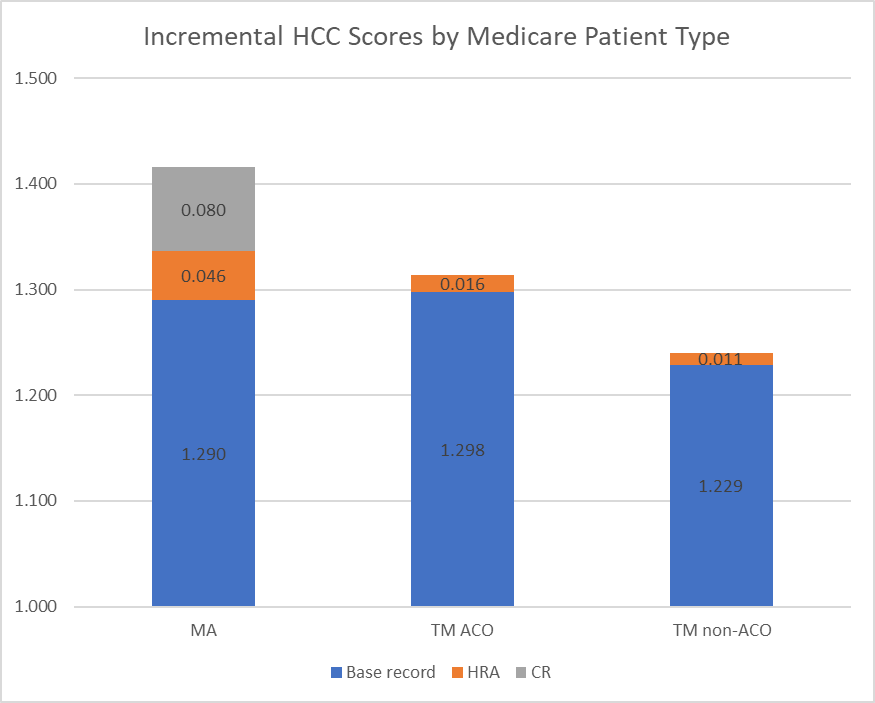To account for variations in illness burden throughout a Medicare Merit (MA) plans affected person inhabitants, makes use of threat adjustment in keeping with affected person illness burden. Particularly, MedPAC notes that:
Medicare makes use of beneficiaries’ traits, equivalent to age and prior well being prerequisites, and a risk-adjustment type—the CMS hierarchical situation classes (CMS– HCCs)—to increase a measure in their anticipated relative threat for lined Medicare spending.
In February 2023, CMS CMS revealed a realize of proposed rulemaking to replace their HCC threat adjustment set of rules (v28). Those adjustments integrated (i) leveraging ICD-10 reasonably than ICD-9 codes as the main development blocks, (ii) use of 115 HCC signs reasonably than 79, and (iii) constraining some coefficients to be equivalent throughout severity ranges (e.g., diabetes, middle failure). The brand new set of rules will probably be phased in all the way through 2024–2026.
One key query is whether or not suppliers beneath conventional Medicare (TM) code otherwise than Medicare Merit (MA) plans. As a result of MA plan cost from CMS relies on affected person severity, there’s an incentive to up-code diagnoses. A paper through Carlin et al. (2024) objectives to guage whether or not or now not this happens. They first give an explanation for the mechanism wherein MA plans may just extra totally seize affected person secondary diagnoses:
MA plans have a possibility to study scientific data to make sure that suppliers didn’t by accident overlook a prognosis from stumble upon data. Those opinions are extra essential when the suppliers’ repayment does now not incent detailed coding of the sufferers’ secondary diagnoses. MA plans to make corrections so as to add or (hardly) delete a prognosis thru CR data. As well as, each MA and TM suppliers would possibly report further diagnoses thru a HRA [health risk assessment] all the way through a wellness discuss with or a house discuss with for this goal.
The authors use 2019 CMS claims knowledge and divide the information into 3 cohorts: MA plans, TM beneficiaries attributed to ACOs (“TM ACO”), and TM beneficiaries now not attributed to an ACO (“TM non-ACO”). ACO comprises sufferers as a result of responsible care organizations (ACO), equivalent to the ones taking part within the Medicare Shared Financial savings Program (MSSP). The authors observe that the TM non-ACO cohort serves as a key comparability since they aren’t matter to the similar coding depth incentives skilled through MA plans and TM ACOs (since ACO shared financial savings is also threat adjusted).
The authors determine sufferers who had a HRA in keeping with whether or not they had an annual wellness discuss with, preliminary preventive bodily examination, or decided on house well being visits (following the Reid et al. 2020 set of rules). The authors additionally use knowledge from stumble upon claims on whether or not a affected person chart assessment happened. The use of those knowledge, the authors propensity-score matched the MA, TM ACO, and TM non-ACO cohorts. The authors then examine the matched and unequalled HCC rankings and evaluated how the HRA and CR visits impacted the HCC threat rankings. They to find:
Incremental well being threat because of diagnoses in HRA data greater throughout protection cohorts in keeping with incentives to maximise threat rankings:+0.9% for TM non-ACO,+1.2% for TM ACO, and+3.6% for MA. Together with HRA and CR data, the MA threat rankings greater through 9.8% within the matched cohort.

Analysis codes associated with vascular prerequisites, congestive middle failure, and diabetes had the biggest contribution to reasonable HCC rating throughout all 3 cohorts. Vascular, pscyh, and congestive middle failure had been in all probability to extend because of HRA/CR coding depth actions.
Whilst different papers have claimed Medicare Merit have upcoded diagnoses for extra favorable repayment, this paper obviously specifies now not simplest the magnitude of the affect, but additionally the mechanism wherein it’s in all probability to happen. You’ll learn the entire paper right here.
